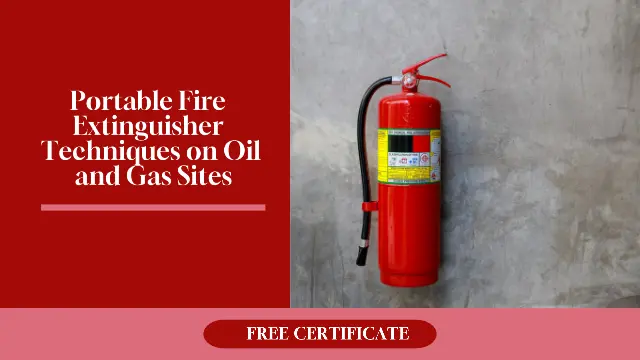
Portable Fire Extinguisher Techniques on Oil and Gas Sites
Interactive Video Lessons | Free E-Certificate | Tutor Support
METAVERSESKILLS
Summary
- Certification of Completion - Free
- Tutor is available to students
Add to basket or enquire
Overview
This comprehensive online course is designed to provide participants with the knowledge and skills required to safely and effectively use portable fire extinguishers on oil and gas sites. Through a combination of video lectures, demonstrations, interactive quizzes, and hands-on exercises, participants will gain a deep understanding of fire safety principles and learn how to respond confidently in emergency situations.
Description
**Module 1: Introduction to Fire Safety in the Oil and Gas Industry**
- Understanding the importance of fire safety in the industry
- Regulations and standards
- Common fire hazards on oil and gas sites
**Module 2: Fire Chemistry and Behavior**
- Basics of fire: the fire triangle and tetrahedron
- How fires spread and develop
- Hazardous materials and fire
**Module 3: Types of Fire Extinguishers**
- Overview of fire extinguisher classifications
- Selection and placement of fire extinguishers
- Proper maintenance and inspection
**Module 4: Fire Extinguishing Agents**
- Different types of extinguishing agents
- Effectiveness of each agent against specific types of fires
- Handling and storage of extinguishing agents
**Module 5: Practical Fire Extinguisher Techniques**
- Hands-on demonstrations of using various portable fire extinguishers
- Proper techniques for different fire types (e.g., Class A, B, C, D, and K)
- Firefighting safety procedures
**Module 6: Emergency Response and Evacuation**
- Developing an emergency response plan
- Evacuation procedures and assembly points
- Communication during emergencies
**Module 7: Fire Safety Assessments and Prevention**
- Conducting fire risk assessments
- Preventive measures and best practices
- Continuous improvement in fire safety
Who is this course for?
- **Fire Safety Technician Trainee:**
- Entry-level position focused on learning the basics of fire safety and prevention.
- Responsible for assisting with fire equipment inspections and safety drills.
- **Fire Safety Technician:**
- After gaining experience, technicians can become responsible for conducting fire risk assessments and ensuring compliance with safety regulations.
- **Fire Safety Specialist:**
- Specialists have in-depth knowledge of fire safety and are responsible for developing and implementing fire safety programs on oil and gas sites.
- **Safety Supervisor or Manager:**
- With further experience and additional training, individuals can advance to supervisory or managerial roles, overseeing safety programs and teams on larger sites.
- **Safety Consultant or Trainer:**
- Experienced professionals can branch out into consulting or training roles, where they provide expertise and deliver training programs like the one you've created to other professionals in the industry.
- **Fire Safety Engineer:**
- For those with a strong engineering background, pursuing a career as a fire safety engineer is another option, focusing on designing fire safety systems for oil and gas facilities.
- **Emergency Response Team Leader:**
- With extensive experience, individuals can become leaders of emergency response teams, coordinating efforts in the event of fires and other emergencies.
Requirements
No prior knowledge or experience required
Career path
- Video lectures and demonstrations
- Interactive quizzes and assignments
- Downloadable resources (PDFs, checklists, reference materials)
- Hands-on exercises and simulations (if possible)
Questions and answers
Currently there are no Q&As for this course. Be the first to ask a question.
Certificates
Certification of Completion
Digital certificate - Included
Reviews
Currently there are no reviews for this course. Be the first to leave a review.
Legal information
This course is advertised on reed.co.uk by the Course Provider, whose terms and conditions apply. Purchases are made directly from the Course Provider, and as such, content and materials are supplied by the Course Provider directly. Reed is acting as agent and not reseller in relation to this course. Reed's only responsibility is to facilitate your payment for the course. It is your responsibility to review and agree to the Course Provider's terms and conditions and satisfy yourself as to the suitability of the course you intend to purchase. Reed will not have any responsibility for the content of the course and/or associated materials.


